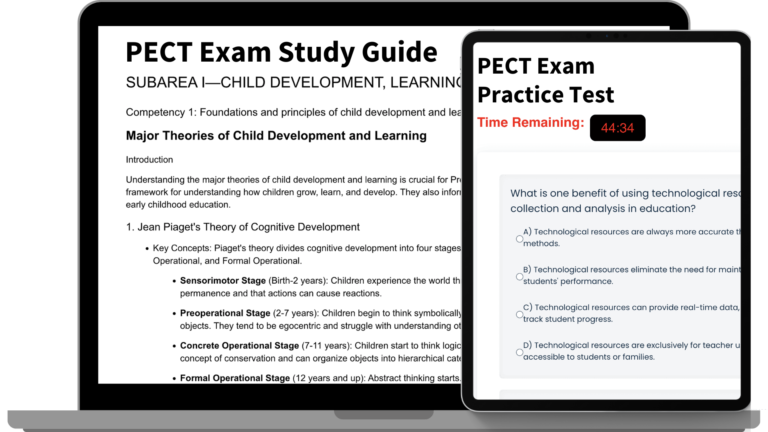PECT PreK-4 Module 1
Introduction
Welcome to the PECT PreK-4 Module 1 page, designed to support aspiring elementary school teachers in Pennsylvania on their journey to certification. This comprehensive resource is tailored specifically for teacher candidates embarking on the exciting path to becoming an educator. Here, you will find an array of information and resources meticulously curated to assist you in preparing effectively for test day. From links to detailed study guides to practice questions, and tips on how to navigate the examination process, our goal is to equip you with everything you need to succeed in this crucial step of your professional journey. Let’s start this educational adventure together, ensuring that you are thoroughly prepared and confident as you approach the PreK-4 Module 1 PECT exam.
Resource Links
Below you will find links to resources that we have created to help you prepare for your exam:
About The PreK-4 PECT Module 1 Exam
| PreK-4 Module 1 | Details |
|---|---|
| Test Design | Computer-based test (CBT) |
| Number of Questions | 36 selected-response items |
| Time | 45 minutes, plus 15 minutes for a CBT tutorial |
| Reference Materials | Glossary of common acronyms used in the field |
| Subareas | I. Child Development, Learning, and Assessment (60%, Objectives 1–3) II. Collaboration and Professionalism (40%, Objectives 4–5) |
What's On The Test
In order to be prepared for Module 1, you’ll want to understand what’s on the test. Notice from the table above that Module 1 is divided into two sections:
- Child Development, Learning, and Assessment, and
- Collaboration and Professionalism
Important to note: These two subareas are not split equally. As we can see, Subarea 1 is worth 60% of your total Module 1 score, whereas Subarea 2 is worth 40%. This means that you will want to allocate your time accordingly. Next, let’s go over the kinds of topics you’ll want to be ready for within each subarea, so you can ace your PreK-4 Exam.
Subarea I: Child Development, Learning, and Assessment
This section of Module 1 covers three core exam objectives. For Objective 1 of the PreK-4 PECT Exam, you will need to be prepared to demonstrate a comprehensive understanding of the foundations and principles of child development and learning. This includes:
Knowledge of Child Development Theories: Candidates should be familiar with major theories of child development and learning, as well as the philosophical, historical, and research foundations of PreK-4 education. They need to understand how these theories and foundations shape current educational practices.
Understanding Developmental Progressions: Recognizing the typical progressions in cognitive, physical, social, emotional, behavioral, and linguistic development in children is crucial. This involves understanding how children grow and develop in these areas.
Influences on Child Development: Candidates should demonstrate knowledge of various factors that can influence children’s development and learning. This includes prior knowledge and experiences, family and community environments, brain development, health, and nutrition. They need to understand how to tailor learning experiences to cater to the diverse needs of all children.
Children’s Learning and Knowledge Internalization: Understanding how children learn, internalize knowledge, and develop performance and thinking skills is essential. Candidates should be adept at implementing developmentally appropriate practices to enhance learning for all children.
Application of Pennsylvania PreK-4 Learning Standards: Applying knowledge of these standards is crucial for implementing effective, appropriate, and meaningful instruction that is both challenging and accessible to all students.
Influence of Classroom Environments: Candidates need to understand how different classroom environments can affect children’s learning. They should be skilled in creating inclusive, respectful, supportive, motivating, and challenging learning environments.
Selection and Adaptation of Teaching Materials: This involves the ability to choose, design, adapt, and use appropriate teaching materials, activities, and technologies. These resources should support the development and learning of all children, including those with disabilities and English language learners.
Understanding and Embracing Diversity: Demonstrating an understanding of diversity among young children is key. Candidates should be able to plan, implement, and adapt instructional strategies and practices that are developmentally, culturally, and linguistically appropriate for all children, ensuring that the needs of a diverse student population are met effectively.
For Objective 2, you’ll want to be ready to answer questions about understanding various types of assessment and evaluation, as well as using these assessments to ensure children’s continuous development and achievement of defined standards and goals. Here’s what you need to focus on:
Understanding Types of Assessments: You should demonstrate an understanding of the different types of assessments used in a standards-aligned system, like authentic, screening, diagnostic, formative, summative, and benchmark assessments. Understand their roles in data-based decision-making processes.
Characteristics of Assessments: Gain knowledge about the characteristics, uses, advantages, and limitations of different types of informal and formal assessments. This includes systematic observations, portfolios, peer assessments, group assessments, curriculum-based assessments, criterion-referenced tests, and norm-referenced tests. Learn how to select, construct, and use these strategies effectively for various purposes and needs.
Designing and Implementing Assessments: Apply strategies for designing, implementing, and interpreting assessments. This will help you identify students’ strengths, needs, and preferred learning modes, differentiate and modify instruction, track progress, and adjust instruction effectively.
Using Multiple Indicators: Recognize the importance of using multiple indicators, including standardized assessments and progress monitoring, to identify individual needs and support the development of all students.
Ethical Practices in Assessment: Demonstrate knowledge of ethical practices in assessment and strategies for avoiding bias during the assessment process.
Assessment for Diverse Learners: Understand principles and practices for assessing students with disabilities, including legally acceptable modifications and accommodations. Also, be familiar with strategies for using Pennsylvania’s Language Proficiency Standards for English Language Learners PreK–12 (ELPS) to design content assessments for English language learners.
Record Keeping and Data Analysis: Learn how to establish and maintain records of students’ performance and use technological resources to collect, analyze data, and interpret results.
Building Assessment Partnerships: Demonstrate knowledge of strategies for establishing, developing, and sustaining assessment partnerships with families and colleagues. Also, understand how to communicate responsibly and effectively with students, families, and colleagues about performance and progress.
Focusing on these areas will equip you with the necessary knowledge and skills to handle assessments and evaluations effectively, ensuring that you can support and track your students’ developmental progress.
For Objective 3, you’ll need to focus on understanding strategies to meet the needs of English language learners and students with disabilities in an inclusive PreK–4 setting. Here are the key areas to concentrate on:
Cultural Responsiveness in Instruction: Demonstrate knowledge of cultural elements like values, communication, and learning styles. Understand how cross-cultural differences affect teaching and learning for English language learners and develop strategies for culturally responsive instruction that incorporates cultural and linguistic diversity without bias.
Understanding Language Systems and Acquisition: Gain an understanding of language systems, structures, functions, and variation. Recognize the differences between academic language and social language, and the similarities and differences between first- and second-language acquisition and literacy development.
Standards-Based Instruction for English Language Learners: Understand the principles of standards-based instruction and assessment for English language learners. Implement research-based instructional strategies that integrate Pennsylvania’s Language Proficiency Standards for English Language Learners PreK–12 (ELPS) with Pennsylvania academic standards, making content comprehensible for all English language learners.
Identifying Atypical Development: Identify atypical progressions in cognitive, physical, social-emotional, behavioral, and linguistic development in children. Understand the characteristics, prevalence, etiologies, and educational implications of different types of disabilities.
Universal Design and Accommodations: Apply knowledge of universal design principles to implement accommodations and modifications as per each student’s Individualized Education Program (IEP). This includes using assistive technologies, material adaptations, and environmental arrangements.
Role in the IEP Team: Understand your roles and responsibilities as a collaborative member of the IEP team and in transition planning (e.g., from preschool to school entry, between grade levels).
Instructional Practices for Students with Disabilities: Apply effective research-based instructional practices and strategies for students with disabilities in inclusive settings. This involves scaffolding instruction and implementing instructional adaptations to provide curriculum content accessibly.
Legal and Professional Responsibilities: Demonstrate an understanding of the legal rights, professional roles, and responsibilities related to meeting the needs of English language learners and students with disabilities. This includes implementing the IEP, understanding legal responsibilities, recognizing the overrepresentation of minorities in special education, and identifying professional resources and organizations for diverse learners.
Focusing on these areas will prepare you to effectively support and teach English language learners and students with disabilities in an inclusive PreK-4 classroom environment.
Subarea II: Collaboration and Professionalism
For Objective 4 in Subarea II (Collaboration and Professionalism) of the PreK-4 PECT Exam, you’ll need to delve into the topics surrounding family and community relationships and collaboration with families, colleagues, and other professionals. Here’s what you should focus on:
Theories of Family Systems: Gain an understanding of family systems theories and their significance in children’s development. Acknowledge the role families play in the educational and developmental journey of children.
Laws on Confidentiality: Be knowledgeable about laws related to family and student confidentiality. Understand classroom practices that protect the legal rights of students and families.
Communication with Families: Recognize the importance of regular communication with families. Develop strategies for establishing and maintaining positive, collaborative, and culturally responsive relationships with families. This involves understanding family information needs and involving them in policy decisions.
Cross-Cultural Competence: Apply strategies to become cross-culturally competent and globally aware. Acknowledge variations in beliefs, traditions, and values related to children and learning across different cultures, and understand how culture influences individual beliefs, values, and behaviors.
Community Resources: Demonstrate knowledge of community resources like cultural institutions, businesses, and social service agencies. Develop strategies for linking families to these resources and using them to meet children’s needs and promote their development and learning.
Collaboration with Professionals: Apply knowledge of strategies for consulting and collaborating with colleagues and other professionals, such as teachers in other classrooms, special education personnel, counselors, and community members. This collaboration is crucial to promote children’s development and learning.
By focusing on these areas, you will be prepared to build and maintain effective partnerships with families and colleagues, and to utilize community resources, all of which are fundamental in supporting the holistic development and learning of children in a PreK-4 setting.
For Objective 5, you need to understand the legal, ethical, and professional roles and responsibilities of a PreK-4 teacher. Here’s what to focus on:
Creating a Positive Learning Environment: Recognize the value of establishing and maintaining a positive social context for learning. Learn strategies for creating a community of learners where every child feels included and valued.
Knowledge of PreK-4 Programs and Regulations: Demonstrate knowledge of various types of state and federal PreK-4 programs, including understanding their regulatory processes and program guidelines.
Legal and Ethical Regulations: Apply knowledge of legal and ethical regulations and guidelines related to PreK-4 education. This includes familiarizing yourself with Pennsylvania’s Code of Professional Conduct and the National Association for the Education of Young Children (NAEYC) Code of Ethical Conduct.
Professional Practices and Responsibilities: Recognize your roles and responsibilities as a PreK-4 teacher and a public employee. This involves engaging in appropriate professional practices, using information and technology correctly, and being aware of signs of abuse and neglect, including the responsibility to report known or suspected cases.
Advocacy for Students and Families: Develop strategies for serving as an effective advocate for individual students and families, ensuring their needs and interests are represented and addressed.
Lifelong Learning and Professional Growth: Recognize the importance of continuous lifelong learning, reflection, self-assessment, and professional growth. Understand how these practices contribute to improving instruction and achieving professional goals.
Utilizing Professional Development Resources: Demonstrate knowledge of various professional development opportunities and resources, such as professional journals, educational research, workshops, mentorships, and online resources. Learn how to use these tools to stay current in the field, enhance content knowledge and pedagogical skill, promote reflection, and support your professional growth.
By focusing on these areas, you will be well-prepared to fulfill your role as a PreK-4 teacher, not only in terms of classroom teaching but also in terms of legal and ethical responsibilities, professional development, and advocacy for the educational community.



